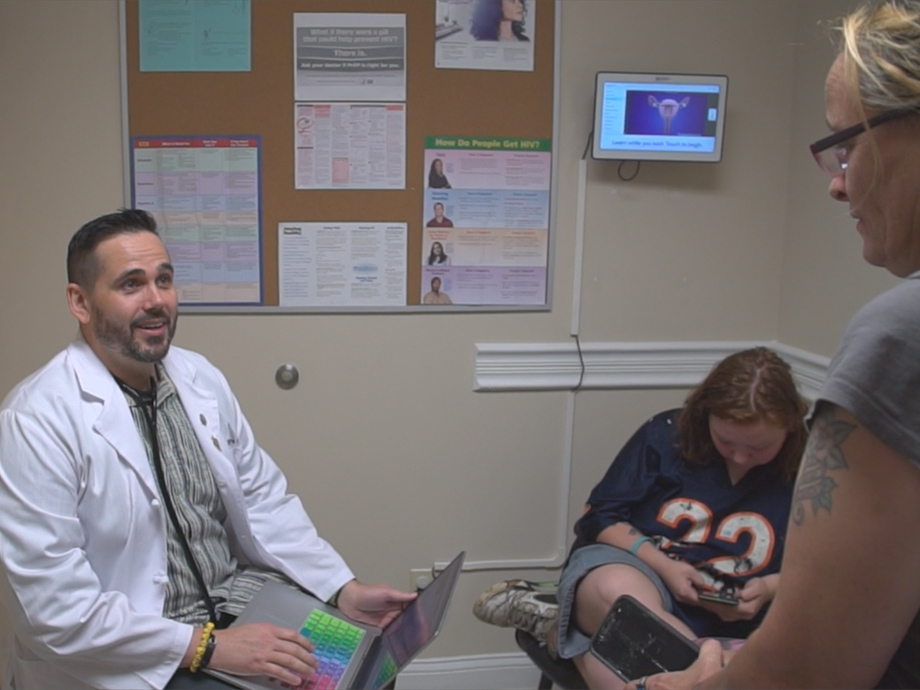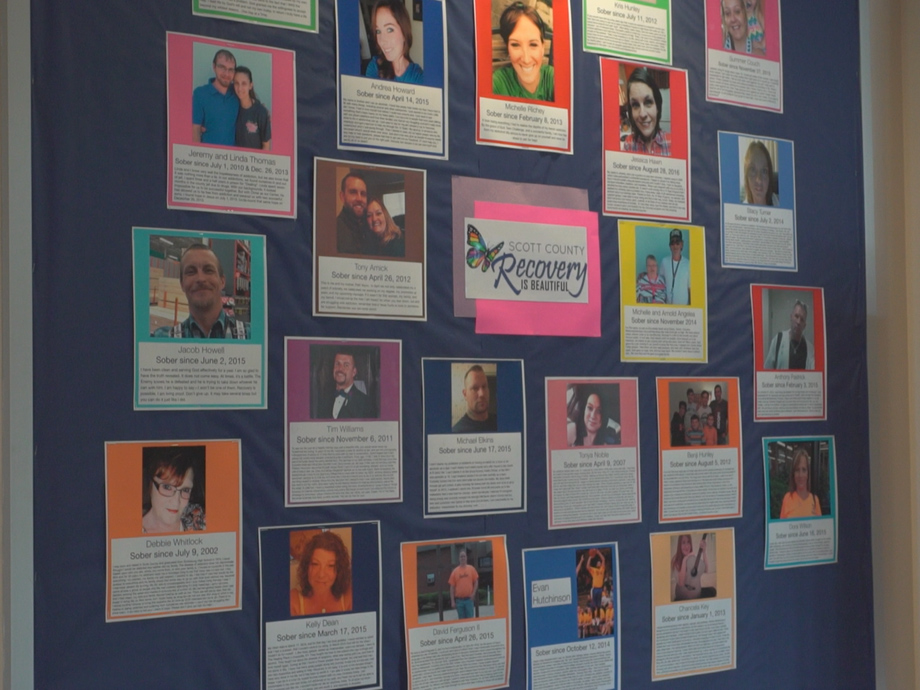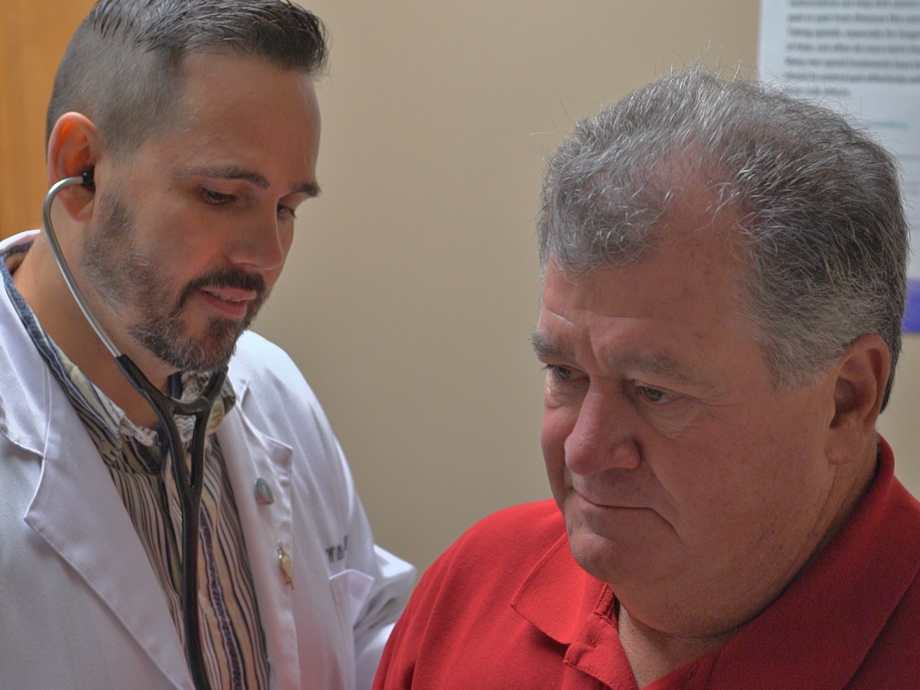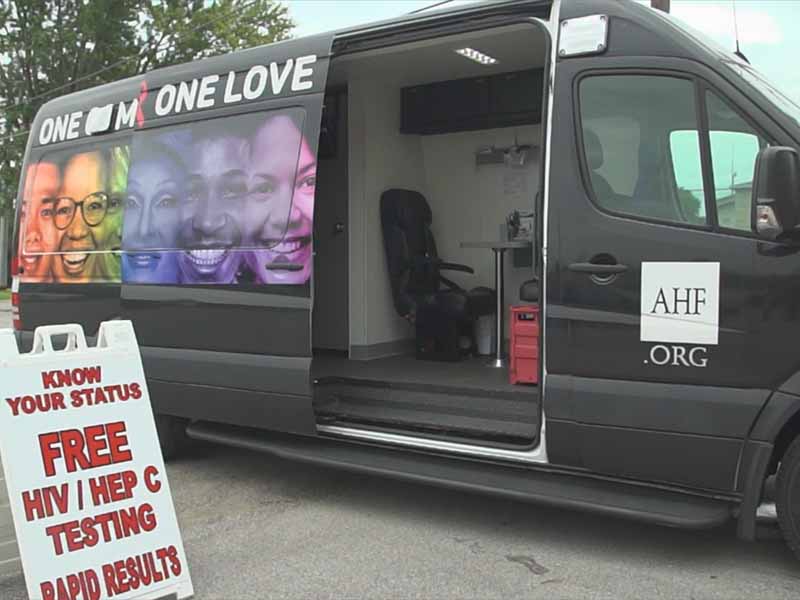2019 Family Physician of the Year
Compassion, Faith Drive FPOY to Help Patients, Community
October 11, 2018, 01:32 pm Michael Devitt – Will Cooke, M.D., was 16 when he decided he wanted to be a doctor.
"I grew up around medicine," Cooke told AAFP News, explaining that his mother worked as a registered nurse at Clark Memorial Hospital in Jeffersonville, Ind., while he was growing up.
Even with that background, though, becoming a physician wasn't his first choice. He was active in his local church and frequently talked with his youth pastor about a career in the ministry.
One evening in church, Cooke publicly committed himself to some sort of mission-oriented work, although he didn't know what that might be.
Later that night, however, his gums started to bleed and an ankle he had previously sprained started to swell. Cooke's parents took him to a children's hospital in nearby Louisville, Ky., where doctors diagnosed him with idiopathic thrombocytopenic purpura. Cooke found himself in the hospital for five days.
The condition didn't cause any pain, and he spent the time observing the steady flow of doctors, nurses and residents intent on managing his treatment.

Will Cooke, M.D., speaks with a patient at Foundations Family Medicine in Austin, Ind. Cooke was recognized as the 2019 AAFP Family Physician of the Year. during this year's Family Medicine Experience in New Orleans.
He was captivated.
The fact that his illness cropped up on the same day he voiced his commitment to serving others made an impression, too.
"It made me feel like I needed to pay attention to that moment, and I started to really consider becoming a physician at that point," Cooke said.
When his youth pastor visited the hospital and asked about his future plans, Cooke had an epiphany. He remembered their previous talks, as well as a saying his mom had taught him: Leave the world a better place than you found it.
"I think being a community physician could be my mission to help people," Cooke recalled saying.
And just like that, his life path became clear.
After completing undergraduate degrees at Indiana University (IU) Southeast in nearby New Albany, Cooke began his medical studies at the American University of the Caribbean, later transferring to the IU School of Medicine in Indianapolis, where he graduated in 2001.
When it came time to choose a specialty, the choice was obvious.
Story Highlights
"I knew I wanted to be in primary care and be able to take care of kids, adults, pregnant women, everything in between," Cooke said. "Family medicine was really the only thing that made sense for me."
Cooke completed his residency at IU Health Ball Memorial Hospital in Muncie in 2004 and opened his practice -- Foundations Family Medicine -- in Austin, a small town in Scott County about 35 miles north of Jeffersonville.
He's been in Austin ever since -- most of that time as the only physician in a town of 4,500 residents the CDC once called "ground zero" for the worst drug-related HIV outbreak in U.S. history.
Today, Cooke is being honored as the 2019 Family Physician of the Year (FPOY). He is being recognized not only for his efforts to curtail that HIV epidemic, which devastated Austin and surrounding areas, but also for his ongoing work in tackling the opioid crisis, his compassion in caring for patients, and his tireless service and commitment to the people of Scott County.
Early Days
Cooke chose to practice in Austin for several reasons.
One was family; setting up shop in Austin put him just a 30-minute drive from New Albany, where his parents lived.
But Cooke also wanted to practice where people needed him.
"I knew I wanted to go to a more rural area that didn't have access to medical care," he said. "An urban setting just didn't make sense with what I felt was my calling: to be a community doctor in a rural area."
Cooke also wanted to practice where local groups could support and build ties between his practice and the community. At the time, two organizations -- the Austin Rural Enterprise Community and the Scott County Partnership -- were working to redevelop Austin and improve living conditions throughout Scott County. To him, it sounded like a win-win.

The Scott County Recovery Is Beautiful wall, featuring people who have battled addiction, is intended to showcase lives that have been saved and reduce the stigma surrounding addiction, mental illness and recovery.
"I felt like going to Austin, I'd be able to make a difference, bring access to medical care to people who didn't have it, while still having that support and connection with the larger community," Cooke said.
Only after opening Foundations Family Medicine did Cooke realize what he'd gotten into.
"I was it," he recalled. "There was nothing else, no other services at all from any standpoint. I was it."
Cooke found himself treating the residents of a county with some of Indiana's highest poverty rates and lowest overall health measures. Drug use and prostitution were pervasive. Patients presented with uncontrolled diabetes, late-stage cancers that had gone undetected and other chronic diseases. Many patients relied on Medicaid or had no insurance at all.
"It was really challenging," Cooke said. "I had gone on and led several mission trips to South American countries, and it was more challenging than any medical trip I'd ever been on."
Beneath all this, the Great Recession started to take its toll. In 2008, the Austin Rural Enterprise Community dissolved, ripping away a chunk of Cooke's support network.
That, along with the area's complex social issues, began to chip away at Cooke's well-being.
"I was really wondering what I was doing there, and I felt disconnected and unable to do what I thought I needed to be able to do," he said.
Even before the Great Recession hit, though, Cooke said he'd noticed something odd going on with some of his patients.
"From the time I opened the practice, there was this disproportionate number of people, I thought -- for the size of the town -- requesting pain medications, muscle relaxers, sedatives and all of that," he recalled.
In 2010, Cooke noticed something else. Patients started walking into the emergency department at the hospital, where he also worked, with skin abscesses and hepatitis C -- two telltale signs of IV drug use.
Cooke and other community leaders did what they could. They formed the Get Healthy Scott County Coalition to address socioeconomic factors that led to drug use. In 2011, Cooke reached out to the Indiana Family and Social Services Administration's Division of Mental Health and Addiction (DMHA) for assistance. That led to the creation of a local drug screening and intervention program for teenagers, but there was no corresponding program for adults.
Around the same time, the manufacturer of oxymorphone (Opana), which had become the drug of choice in Austin, began marketing a new "abuse-deterrent version" of the drug. Users who had previously crushed and snorted the pills quickly got around the reformulation obstacle and started melting the pills and injecting the substance intravenously, often while sharing needles.
Cooke wasn't an expert on addiction medicine -- not then, anyway -- but he knew that diseases such as HIV spread the same way as hepatitis C, and there was little he could do to stop it. "All of these things were warning signs," Cooke said. "We knew something really bad was going on."

Will Cooke, M.D., examines a patient during a routine visit.
HIV Outbreak
Cooke realized what that "something" was in February 2015, when the Indiana State Department of Health announced an HIV outbreak in Scott County.
Cooke immediately reached out to officials at the state health department and DMHA, including Jerome Adams, M.D., M.P.H., then the Indiana state health commissioner (and current U.S. surgeon general). Together, they formulated a plan to address the epidemic from several angles.
Key to the plan was the implementation of a needle exchange program. Cooke educated himself about these programs and publicly endorsed them as an effective means of stopping the spread of diseases such as HIV.
Two obstacles stood in Cooke's path, however. The first was existing Indiana law, which banned the practice outright. The second was (then) Gov. Mike Pence, an outspoken opponent of needle exchange programs.
But Cooke learned that there was a movement underway to lift the ban. The following month, he and about 20 other community leaders met with Pence to discuss their concerns, including the idea of a needle exchange program.
"I spoke directly to him about giving us access to resources to implement a syringe service program, that this had to be a piece of the response in order to get ahead of this and be successful," Cooke recalled. "His concern was from a law enforcement standpoint; he wanted to be very clear that he didn't believe in needle exchanges.
"I basically shared that this was an evidence-based approach to decrease the spread of HIV and hepatitis C. It had nothing to do with law enforcement. This was a public health issue, and it had to be done in order to meet the needs of our community at the time. And he said he would pray about it."
Within days, Pence signed a temporary executive order allowing Scott County to implement a needle exchange program. The program opened in downtown Austin in April 2015, providing clean syringes, HIV testing, drug treatment referrals and other services. (Eventually, the state legislature passed a law that allowed for needle exchange programs on a limited basis.)
Within two weeks of opening, the program had handed out more than 5,000 clean syringes. Outside organizations such as the CDC, IU Health and the AIDS Healthcare Foundation soon descended on Austin, creating a previously nonexistent safety net

Twice a week, staff from Foundations Family Medicine take a mobile unit around Austin and the surrounding communities to provide free HIV and hepatitis C testing, as well as community outreach and linkage to care.
"Things were absolutely bonkers," Cooke said of his practice during this time. And with the practice serving as a hub for the various groups that responded to the outbreak, Cooke sometimes found himself in the crosshairs of upset residents.
"We got a bit of the ire of the community," he said. "People would call us to let us know how angry they were with us. We had patients leave the practice, not show up to appointments, refuse to be in the waiting room with patients who had HIV. It was a very challenging time."
Through it all, Cooke knew that he was doing the right thing and that the attention Austin was receiving wouldn't last forever.
"I knew when everything was said and done, it would just be me again with whatever local resources we were able to establish. So I had to make sure that the community had everything we could possibly need in place to take care of everyone in the community," he explained.
"We had 238 individuals in the community with HIV, and I needed to make sure that when all the lights and cameras left, I'd still be able to meet those needs."
Cooke established networks with infectious disease specialists. He worked with the health department to enable primary care physicians in Indiana to treat hepatitis C under certain guidelines. And he obtained certifications in addiction medicine and HIV medicine.
Less than four years later, the turnaround has been dramatic.
"In Scott County, hepatitis C numbers have gone down, whereas in most every other county in Indiana and across the country, they're going up, so I'm really pleased to see our hard work is paying off," Cooke said. "Our viral suppression rate for HIV is 76 percent. Nationally, it's at only 49 percent."
Cooke has also seen success in the county health department-run needle exchange program, which is ongoing.
"About 98 percent of people who inject and have HIV are accessing the syringe service program," he said. "That proves that people, even though they're viewed as criminals, they're willing to be responsible for themselves and their community when given the opportunity by accessing the syringe service program responsibly. I think that's a big deal."
Perhaps most important, Cooke has seen a difference in his practice's ability to care for patients with addiction issues.
"When people come to me wanting help for their addiction, it used to be that I really didn't have anything to offer them," he said. "They would come in, pour their heart out to me, and there was nothing … it was really difficult to deal with that.
"Now, when somebody comes in and says they're struggling with addiction, I can give them some evidence-based advice on what that looks like for them going forward. I can do warm handoffs directly with behavioral health specialists and recovery coaches. I can provide suboxone or naltrexone to help them with cravings and protect them from overdose. I can connect them to syringe service programs to keep them safe. I have an inpatient residential treatment facility that I can see patients at and care for them right here in Scott County.
"It's night and day."
Connecting With Patients
Cooke's approach to healing can be summed up in one word: compassionate.
"I try to see every single person I take care of as a person first," he said. "Whether it's the CEO of the hospital or a homeless guy who's shooting up heroin on a daily basis, they are both people before anything else … My responsibility is to take care of both of them the same way."
To do this, Cooke relies heavily on his staff. He routinely sends them out to check on patients and locate individuals who have just been released from jail or a rehab facility. In some cases, that means finding people a place to stay or even just something to eat.
"That person is important. That's a human being who deserves the opportunity to do well," Cooke said.
Cooke shares that view with the medical students he precepts. He reminds them to never view patients simply as a diagnosis that needs treating or a bunch of numbers that fit into some preconceived formula.
"I tell my medical students that part of our job is to listen to the story that a person is telling themselves," Cooke said. "We've got to connect with them on the human level first, and help them to feel alive, with purpose and meaning in their life."
Cooke also reminds students that medicine is an art as well a science. His take: The science of medicine is demanding, but the art of medicine is unforgiving.
The science of medicine, Cooke explained, is data-driven. Take a patient's temperature, weight and blood pressure, run blood tests and order a CT scan, if indicated, and it's pretty easy to come up with a diagnosis and a treatment plan.
But if a physician doesn't take the time to read between the numbers, a lot can be overlooked.
"If we miss the fact that they're going through a divorce, and their daughter died last year, and they're not going to be compliant with anything we do because they're depressed, we missed it," Cooke said. "If we fail to connect with them as a person first, we miss it completely. That's why I say it's unforgiving, because if we miss that, we miss the opportunity to actually help this person have a successful opportunity going forward."
Cooke credits his faith for this approach.
"Faith is important to me, and my faith demands that I love people, and it's through the love of people, the compassion and the relationships built that we can get to the place where we're trying to overcome this or that thing in their life," he said.
"We've got to approach people not through the 'sins' that we see, we've got to approach people through a lens of compassion first. It's through that compassion that we approach the harms in other people's lives, not the other way around."
Cooke's connections reach throughout Scott County. When he's not at Foundations Family Medicine, Cooke can be found providing care at any number of places. He directs the hospitalist program at Scott Memorial Hospital in nearby Scottsburg and occasionally works shifts in the hospital's emergency department. He operates and helps support three school-based clinics in neighboring towns and an HIV jail clinic in adjacent Jackson County, sees patients at a local residential drug treatment program, and hosts free health clinics at a local church. He also volunteers as an associate professor of rural medicine at Marian University College of Osteopathic Medicine in Indianapolis and an assistant professor of family medicine at IU.
And with all that, Cooke has made time for family. He and his wife, Melissa, have been married since 2001 and have six children.
The good news is he's no longer Austin's only practicing family physician. James Wilcox, M.D., one of Cooke's former students, joined the practice in September.
"I can't imagine having a better complement than him," Cooke said. "He's a wonderful person who loves what he does and loves people and shows people compassion. It's a pretty amazing thing."
His thoughts on being named the 2019 FPOY? "I would never have imagined that I'd ever have that sort of honor given to me," he said. "It's a bit overwhelming … I feel like I responded to a crisis and, to me, I hope that anybody else would do the same thing. I feel honored and humbled by it."
Related AAFP News Coverage
Q&A With John Cullen, M.D.
Frontier Medicine Honed AAFP President's Leadership Skills
(10/10/2018)
2018 Congress of Delegates
AAFP Delegates Choose New Leaders for 2018-19
(10/10/2018)
2018 Congress of Delegates
COD Addresses Medical Aid in Dying, Institutional Racism
(10/10/2018)
2018 Family Medicine Experience
FPs Make a Difference Volunteering in 'The Big Easy'
(10/10/2018)
2018 Congress of Delegates
Payment Tops FPs' Agenda at Town Hall
(10/8/2018)
Loving Frontier Medicine
Family Physicians Earn Respect in Remote Valdez, Alaska
(6/6/2018)
Additional Resources
2018 AAFP Family Medicine Experience: Day One
2018 Congress of Delegates: Day Three
2018 Congress of Delegates: Day Two
2018 Congress of Delegates: Day One